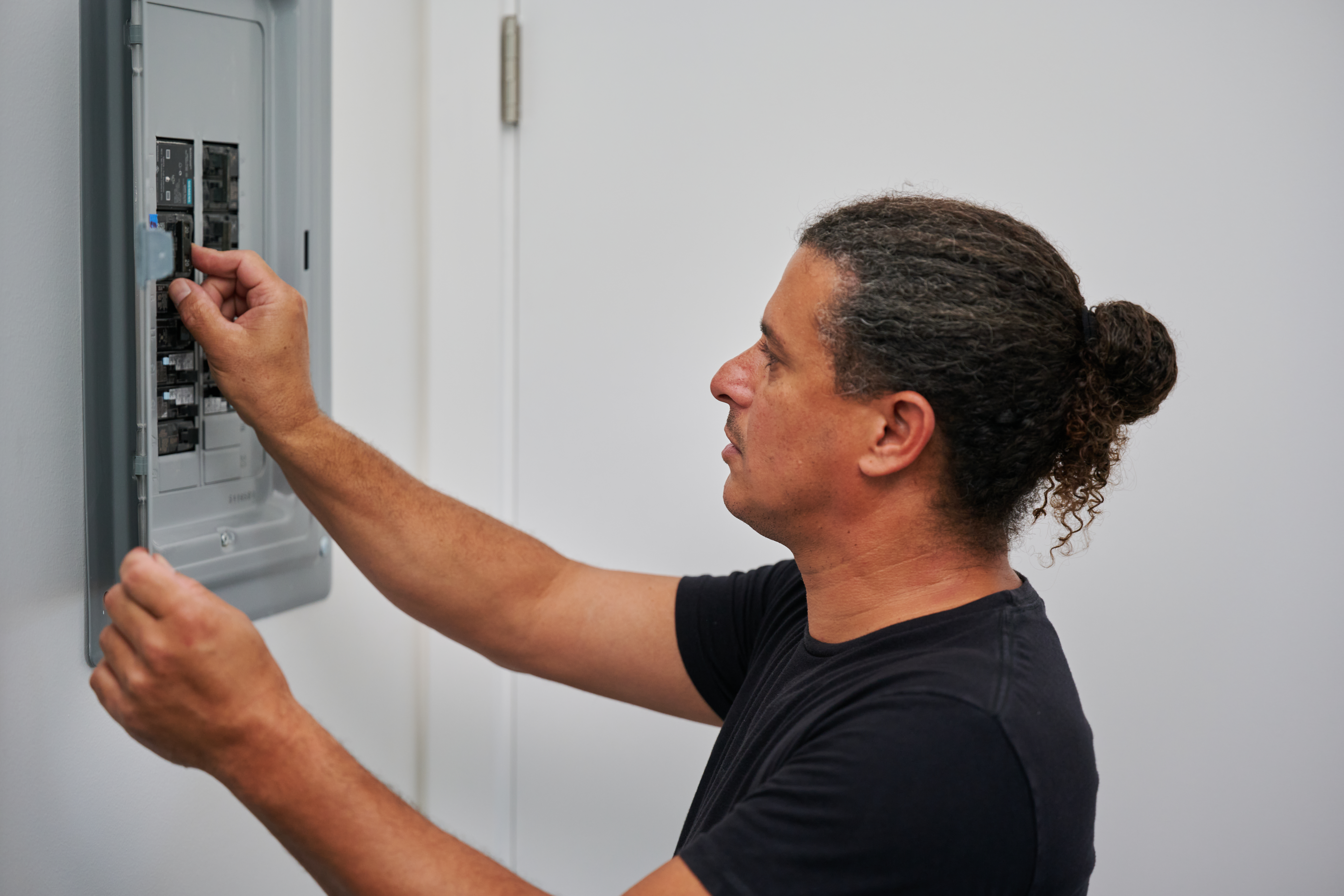
Find out how an EV charger installation can make your electric vehicle ownership experience even better. Learn about costs, benefits, and more.
Learn how to calculate the right water heater breaker size to avoid costly problems


Circuit breakers that aren't sized properly can lead to expensive damage.
The NEC requires circuit breakers to be sized at 125% of the intended load.
Most residential water heaters require a 30-amp circuit breaker.
Water heaters draw quite a bit of electricity during operation, so they need a breaker size that can adequately meet their demands. Breakers that are too small for the water heater will frequently trip, turning your water heater off, while breakers that are too large won't trip when they should, which can lead to fires and other damage. Use this guide to learn everything you need to know to find the right breaker size for your water heater.
Circuit breakers can help to prevent electrical overloads and short circuits. They work by interrupting the flow of electricity when they find that the circuit has faulted or overloaded. Circuit breakers can help to prevent costly and potentially dangerous problems, like fires, equipment damage, and other electrical hazards.
If a circuit breaker isn't properly sized for your water heater's wattage and voltage requirements, it can lead to safety problems. Breakers that are too small will cause the water heater breaker to trip too often, which means it will turn your water heater off even if it's functioning properly. And breakers that are too large won't trip when they should, which can lead to electrical fires.
Plus, under- and oversized breakers will make your water heater less efficient. So finding the right size can help you save on your monthly energy bills.
According to data from Angi customers, most wiring and panel projects (65.7%) involve upgrades to existing service. Upgrading service can be helpful if you’ve recently installed several new appliances (including a modern water heater), need an electric vehicle charger, or are constantly experiencing breaker trips. On the other hand, 34.3% of people need general electrical repairs, such as fixing blown fuses and flickering lights. If any of this sounds familiar, contact an electrician for assistance.

Voltage Rating: Water heaters have voltage ratings, which impact how much amperage they need to operate. Most residential water heaters operate at 240 volts, or 240V.
Wattage Rating: Your water heater's wattage refers to the amount of electrical power it uses to operate. This rating will directly impact the size of the breaker you need.
Amperage: Amperage refers to how much electricity a water heater draws to operate. This rating will also impact what size breaker you need.
Continuous Load: Since water heaters often operate for three hours or more at a time, they're considered continuous load devices. The National Electric Code (NEC) mandates that continuous load circuits shouldn't be loaded to more than 80% of the breaker's amperage rating.
Wire Gauge: Different wire gauges, or sizes, can handle different amperages. So the size of the wires that connect your water heater to the breaker can affect what size breaker you need.
Electrical Codes: Some buildings and municipalities require certain breaker sizes to ensure safety. Before investing in a breaker, contact your local authority to learn about any electrical code requirements.
Ambient Temperature: The ambient temperature, aka the temperature of the environment that surrounds your breaker, can affect its performance, so make sure the breaker you choose is designed for the temperature ranges of the room where you install it.
Presence of Other Loads: If other household systems or appliances are sharing your water heater's breaker, you'll need to factor their electrical draw into the circuit breaker size in addition to the water heater's draw.
There are a few steps you can take to calculate the right size circuit breaker. You can also hire a local water heater pro to help you if you’re not up for the task.
You'll need the voltage and wattage ratings to calculate amperage. You can typically find these ratings in the water heater's manual, on a sticker attached to the tank, or on the thermostat.
Once you have the water heater's voltage and wattage ratings, you can find its amperage by dividing the wattage by the voltage. So if your water heater has a 5,000 wattage rating and 240 voltage, you'd divide 5,000 by 240 to arrive at 20.83 amps.
The NEC Code dictates that a circuit breaker must be sized at 125% of the intended load. So, whatever figure you arrived at during step two, you'd multiply by 1.25 to find your breaker size. For example, a water heater that uses 20.83 amps will require a circuit breaker of at least 26.03 amps since 20.83 x 1.25 = 26.03.
Most residential water heaters require a 30-amp circuit breaker. But if your water heater has a 90-gallon capacity or more, you might need a bigger one. Here's a breakdown of common circuit breaker sizes based on gallon capacity.
| Water Heater Size | Circuit Breaker Size |
|---|---|
| 10 gallon water heater | 20 or 30 amps |
| 20 gallon water heater | 20 or 30 amps |
| 30 gallon water heater | 30 amps |
| 40 gallon water heater | 30 amps |
| 50 gallon water heater | 30 amps |
| 60 gallon water heater | 30 amps |
| 70 gallon water heater | 30 amps |
| 80 gallon water heater | 30 amps |
| 90 gallon water heater | 30 or 40 amps |
| 100 gallon water heater | 30 or 40 amps |
Larrisa treated my home as if it were her own. I appreciated the time and care that was given.
The guys are knowledgeable, experienced and friendly! they found a solution to my ac problem quickly which I was so happy about, summer heat was killing us! and the cost was fair and honest. I felt in very good hands. Not at all scared being in my home alone with them. Recommend them 100%!!!
From average costs to expert advice, get all the answers you need to get your job done.

Find out how an EV charger installation can make your electric vehicle ownership experience even better. Learn about costs, benefits, and more.

Electrical panel replacement costs $530 to $2,100, depending on the location, the type of hardware, and any required building materials.

If you need electrical work done, you’ve probably been asking, “How much does an electrician cost?” We’ll break down all the cost factors for you here.

Wire nuts are used to connect two or more electrical wires. Our guide explains what the different wire nut sizes and colors mean, and when to use each.

Different types of switches can go beyond the basics of controlling lights. Learn the key differences between a single-pole vs. double-pole switch.

Downed power lines are very dangerous. Stay safe by following these instructions if you ever encounter a downed power line.